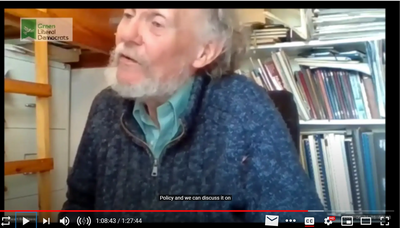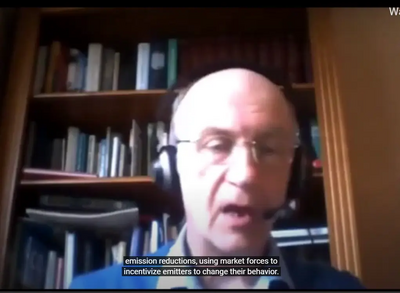A Carbon Tax + Dividend reduces both CO2 and Poverty

A Carbon Tax + Dividend reduces both CO2 and Poverty
Introduction
Most policies to reduce CO2, at various levels of government, are for specific actions, regulations or investments. Many are good policies, but they are limited in scope and may have unforeseen consequences. A tax on carbon, applied initially to fossil fuel at the point of production or import, taxes the pollution, and influences decisions on how to reduce the tax paid across-the-board. It is the cheapest way to reduce CO2.
A relevant reference
A recent paper, quoted in this article, referred to in this article as the Zero Carbon report, is "HOW CARBON PRICING CAN HELP BRITAIN ACHIEVE NET ZERO BY 2050", produced by the Zero Carbon Commission which in turn was set up in Feb 2020 by the Carbon Pricing Leadership Coalition. (Zero Carbon Commission - How carbon pricing can help Britain achieve net zero by 2050 zerocarbon.publicfirst.co.uk ) Note that it uses the euphemism "carbon charge" instead of "carbon tax".
Why a Carbon Tax?
A carbon tax directly raises the price of CO2 emissions, so that market forces change personal and business behaviour away from high emissions and towards low emissions. This is done efficiently, although the scale of savings (and the timescales achieved) by a given tax rate on its own varies in different sectors. The Zero Carbon report gives 6 arguments for carbon pricing. Summarising:
1. Polluters pay
2. It is effective. For example, carbon taxes on electricity generation have reduced CO2 (e.g. from coal), and there are other examples from round the world (e.g. Canada).
3. No need to predict the future. Decisions are made by the people closest to that decision in the knowledge of the carbon price, rather than by a regulator.
4. It motivates everybody. The tax affects all activities that involve emitting CO2.
5. Drives Green innovation.
6. Drives global change if the tax is applied to the carbon embedded in imports
The Zero Carbon report then gives four reasons for preferring pricing (a tax) to cap and trade:
7. The price uncertainty of cap and trade undermines investment
8. Cap and trade is complex to administer
9. Cap and trade systems are susceptible to "exceptions" resulting from lobbying by vested interests.
10. Cap and trade systems are hard to understand, especially by the general public.
Nearly all economists advocate carbon tax as a central policy for reducing emissions. For example, in a most unusually high consensus, early in 2020 over 3500 US professional economists signed a letter advocating this policy. Economists' Statement on Carbon Dividends Organized by the Climate Leadership Council (econstatement.org)
A general carbon tax on its own introduces two undesirable consequences.
(a) It raises consumer prices, which increases poverty. This can be dealt with by paying some or all of the extra money raised by the tax back to the population in the form of a dividend, which, as discussed later, would convert the tax from being regressive to being progressive.
(b) It causes carbon leakage, meaning that emissions are shifted from this country to countries with little or no carbon tax or pricing via an ETS (Emissions Trading Scheme). This occurs via carbon embedded in goods (especially carbon-intensive goods), which increases the competitiveness of imports from countries with little or no carbon tax over domestic production and reduces the competitiveness of exports. Carbon leakage is discussed later. The primary solution is BCAs (Border Carbon Adjustments), a form of import tariff based on the carbon embedded in imports (and, for exports, rebates based on the carbon tax paid).
Publish Future Tax Rates
Planned tax rates for several years ahead should be published so investors and others can plan with confidence._ However, the rate of tax is subject to political pressure (especially when there is a change of government), most often for it to be kept low, and this risks reducing the credibility of published future tax rates. This risk would be reduced (but not eliminated) if the responsibility for setting rates is given to a body such as the Climate Change Committee.

Start by taxing Fossil Fuel
It is sensible to concentrate initially on taxing fossil fuel. Other sources of CO2e emissions, such as from methane, or negative emissions, e.g. from land use, could either be introduced into this policy later, or be tackled by other policies.
Taxing Fossil Fuel Upstream is Best
Taxing fossil fuel upstream, at the point of production or import, is recommended, resulting in a uniform tax across all sectors. This would be relatively easy, involving mainly big companies. If a sector is to be partly or wholly exempt, rebates would need to be paid. Also, a higher tax rate could be applied in some areas. However, implementing higher or lower rates in different areas results in greater complexity and risk.
Rebates for CCS
Tax rebates should be given for CO2 saved by CCS (Carbon Capture and Storage).
Tax Rates
The rate of a general carbon tax should increase annually, probably rising to over £100/ton of CO2 in less than 10 years. A starting rate for 2021 of around £30-40/ton is reasonable. (Big changes in the market price of crude oil and gas might be taken into account in setting tax rates.) The Zero Carbon report recommends at least £75/ton by 2030.
Co-existence with an ETS?
A carbon tax could co-exist with an ETS (Emissions Trading Scheme). The UK has been in the EU ETS, and the government is setting up a UK ETS. Probably co-existence should be phased out.
Taxing Petroleum Products?
Much crude oil is not burnt to form CO2, but used to make various useful petroleum products, including plastics. It might be argued that these products should not suffer a carbon tax. Viewed pragmatically, (a) plastics cause a lot of pollution, (b) petroleum products often end up emitting GHGs, and (c) it is simplest not to pay rebates. On balance, petroleum products should not be given a tax rebate.
Peat
Peat contains a lot of carbon and should be preserved. Use as a fertiliser should be banned, as should planting trees on peat bogs.
Dividend discussion
Several studies/analyses of the net effect of a general carbon tax,_combined with using the net extra money raised for some form of Dividend, have shown that, on average, people in the lowest income deciles are net better-off by a substantial %._This revenue recycling makes the tax progressive rather than regressive. (See, for the UK, Global lessons for the UK in carbon taxes - Grantham Research Institute on climate change and the environment (lse.ac.uk) or, for the US, Table 6 in
www.treasury.gov/resource-center/tax-policy/tax-analysis/Documents/WP-115.pdf)
As examples from round the world show, revenue recycling can take various forms or combination of forms. For example, paying cash to households or to individuals. Or some of the money could be used to increase benefits, such as Universal Credit, which would have an even more progressive effect. (If wanted, the Dividend could be clawed back from well-off people by HMRC.)
An aim of the policy should be to make the large majority of poor people richer. This can be achieved, even if some of the money is used for other purposes such as green projects, or even for general government use. (But if all the money is not paid back, opposition might increase, as the tax could be seen as revenue-raising.)
A Policy Motion submitted to the 2020 Autumn Conference, proposed an equal-per-head dividend paid to all adult citizens, and half that rate be paid to parents/guardians for children. People with a below average total carbon footprint are winners, as the dividend exceeds the effect of price rises caused by the tax and. They are subsidised by those with above average footprints, who are losers._
Even if a few outliers can be found of poor people who are not quite better-off from a carbon tax + dividend (which is doubtful), or for admin reasons a few people fail to get the dividend, this is much less important than the vast majority being better-off._
Best to keep it simple
A carbon tax on fossil fuel is a relatively simple tax on CO2 pollution. The consequent emission reductions are due to market forces, not detailed error-prone regulations. Some regulations will be needed to avoid undesirable consequences (such as carbon leakage), or to achieve bigger reductions than a given tax rate can achieve, but these need to take into account the system becoming more complex, error-prone and open to fraud.
Fuel Duty
Fuel duty is a substantial tax. It is effectively a carbon tax, but it also raises a lot of revenue, often viewed as being for roads. To keep the carbon tax uniform, fuel duty could be reduced as the carbon tax rises, so that petrol and Diesel prices do not rise faster than inflation. (Of course, (a) the market price of crude oil is constantly changing, and (b) the government could choose to increase fuel duty.) A stable net tax would avoid the politically sensitive issue of rising petrol and Diesel prices. Money for the dividend should only come from net tax increases, so government revenue from fuel duty is maintained.
International trade - Border Carbon Adjustments (BCAs)
The hardest issue with pricing carbon is preventing carbon leakage. Taxing the carbon embedded in imports (or rebating the carbon tax in exports) involves some assessment of the amount of embedded carbon (in practice almost certainly pretty inaccurate), and the extent to which it has already been taxed. International cooperation will be vital, both to make the tariffs acceptable to the WTO (World Trade Organisation), and to share the work. Studies have shown that WTO rules need not be an obstacle (see www.scribd.com/document/155956625/Changing-Climate-for-Carbon-Taxes-Who-s-Afraid-of-the-WTO
and also the summary in www.carbontax.org/issues/border-adjustments/ )._
The recent top-level EU document about future cooperation with the Biden administration in the US ec.europa.eu/info/sites/info/files/joint-communication-eu-us-agenda_en.pdf is relevant. This says (top p4)
"Together with our partners, the EU and the US can lead the world towards a green, circular, competitive and inclusive economy. This will require investment, innovation and the right price signals. This is why we should work closely together on emissions trading, carbon pricing and taxation. In particular, the upcoming WTO-compatible EU Carbon Border Adjustment Mechanism to avoid carbon leakage can be an opportunity to work together to set a global template for such measures."
This EU-US work could greatly help the UK.
Sometimes, particularly in the early years, technical help and/or partial tax rebates for UK companies making carbon intensive goods may be part of the solution. (See ALTERNATIVES TO A BORDER CARBON ADJUSTMENT in the Zero Carbon report.)
Spreading Carbon Tax around the World
An important advantage of BCAs is that they would encourage other countries to levy their own carbon taxes in order to both avoid the import tariffs, and to get the tax for their own government, rather than it be collected by a foreign government. This would help a carbon tax become more global. For example the Zero Carbon report says:
"THE RUN UP TO COP 26 IS A PERFECT OPPORTUNITY TO CREATE A 'HIGH AMBITION CLUB' OF COUNTRIES DETERMINED TO REACH NET ZERO.
That club would seek to align on carbon pricing levels, and investigate options for a multilateral border carbon adjustment (BCA). One mechanism for this is to agree a 'price floor,' implementing a BCA only where jurisdiction's prices fall short of the floor price. The aim is for the entire world to adopt ambitious, implementable climate policies."_
Territorial or Consumption measure of UK emissions, including for net zero?
Currently a Territorial basis is used (i.e. emissions from UK territory only), for example by the CCC. This is misleading as it ignores carbon embedded in imports. More honest, if more demanding, is to use a Consumption basis, which includes all emissions for which the UK is responsible. Fig 2 in UK's Carbon Footprint 1997 - 2017 (assets.publishing.service.gov.uk/government/uploads/system/uploads/attachment_data/file/918325/Consumption_emissions_March_20_fullycompatible.pdf) shows that in 2017 the UK's Territorial emissions declined about 27% (547 Mtons CO2e to 415), but Consumption emissions declined only about 9% (850 to 773). A big difference!
Stop subsidising fossil fuels
While raising the price of carbon with a tax, lowering fossil fuel prices with subsidies should stop; UK examples are tax breaks on North Sea oil and gas, and the concessionary 5% VAT rate on domestic fuel. The UK also supports schemes abroad that subsidise fossil fuels. (The world total fossil fuel subsidy has been estimated at $55-90bn.)
Campaign Idea
A campaign idea is to get the government to announce, before COP26, that the UK will implement a carbon tax.
Electricity
Electricity is currently over-taxed compared with the early years of a general carbon tax, with a confusing mix of carbon taxes applied to customer bills. Phasing these out and applying a uniform tax would reduce prices.
Agriculture
Agriculture affects GHGs in several ways other than just the use of fossil fuel. (Other GHGs such as methane are involved, as are negative emissions.) The operation of BCAs would be complex. This article does not cover agriculture in depth, but the use of fossil fuel should not be given special treatment - for example, the red Diesel concession should be ended.
Domestic Heating
Some people argue that applying the tax to domestic heating should be delayed until it is easier for households to reduce their emissions. For example, announcements that landlords be required to implement energy efficiency improvements to EPC band C by 2035, and financial support for householders to both insulate and change their heating systems. However, it is simpler and better not to delay taxing domestic heating, partly because the tax will reduce CO2, and because the initial tax rates will be fairly modest.
This is an example of where the tax might be resented if some people cannot do a lot to alleviate their tax, even if the dividend makes the vast majority of poor people better-off. Hence some people advocate delaying the tax in such areas until other policies enable people to do more to mitigate the effect of the tax. There is also concern that the political optics of the tax in some sectors might be exploitable by opponents. There will be opposition to the tax in any event, but this should be countered by rational argument.

Aviation
Before Covid, aviation was about 8% of UK emissions and rising; these emissions should be taxed effectively. Taxing CO2 is more effective than other aviation taxes. A frequent flyer tax based on the number of flights (as proposed in policy paper 139 and elsewhere) ignores both distance flown and seat class. (Seat class is important, because First or Business long-haul seats displace about 5 or 3 Economy seats respectively.) For example, a long-haul flight in First class can cause over 100 times more emissions than a short flight across the channel. Air Passenger Duty takes some account of CO2 differences between long and short haul, and of seat class, but is very imprecise. Because they do not increase the cost of operating a flight, these personal taxes do nothing to increase load factors. Currently, there is an international agreement not to tax aviation fuel; if this can't be overturned, a good proxy is a flight tax based on take-off weight and distance flown.
International cooperation is needed, particularly with the EU, to discourage UK residents from avoiding the tax by flying from a foreign airport, which could actually increase emissions.
The use of carbon offsetting, for example by the aviation industry, should be viewed with suspicion, as the practice is insufficiently regulated. However, in principle, offsetting could help.
Tax or emissions trading?
Which is best is debated, but, as indicated above, future prices can be published for a tax, a tax is simpler to implement, is less open to lobbying by vested interests and is easier to understand.
Other Policies
To achieve the required emissions reductions in several areas, other policies are needed to prevent the need for an extremely high tax rate. A carbon tax will help these other policies achieve their aims, so the policies are not in opposition to each other. Other policies often use regulation; regulations involve choices about technologies and sometimes have unintended consequences. A carbon tax is technology-neutral, as it does not try to "pick winners". Apart from regulation, other policies can include giving accurate factual information, and also "propaganda" to encourage people to reduce emissions.
Reduced importance of some other policies
In that a carbon tax uses market forces to efficiently reduce emissions, the importance of some other (regulation) policies will sometimes be reduced. (Sometimes such policies have unintended consequences and defects.) Some people, for good reasons, have strong opinions on specific policies to reduce GHGs, and these policies have directly visible effects that make supporting them attractive, whereas the working of a tax is largely invisible. This visibility effect should not reduce support for a tax. When a regulation policy is needed, a carbon tax will help it succeed. A carbon tax is not in opposition to other policies.
Unfortunately, the visibility issue is likely to mean that a Johnson government will not support a carbon tax as a central GHG reduction policy, as they are likely to prefer very visible policies that they can claim credit for.
Oil and gas prices in the last 10 years
At times in the last 10 years the price of oil and gas has been around £100/ton higher than it is now, and at times it has changed quite sharply. This means that (a) apart from the effect on international trade, the stress on the economy of a carbon tax on that scale would be less than that experienced in recent history, and (b) the tax is collected by the UK government, rather than, in effect, being paid to the likes of Saudi Arabia.
Changes to Existing LibDem policy (Policy Paper 139, 2019)
Paper 139 said a carbon tax is an efficient way to reduce emissions, but postponed discussion and implementation for two reasons:
(a) A tax would make poor people poorer, especially those with high heating costs.
(b) Although not stated in the paper, it was decided that proposing a new tax shortly before a general election would be bad politics.
A dividend reverses (a).
Carbon leakage is not discussed in Paper 139, so BCA policy is new
Taxing aviation by taxing CO2 emissions supersedes the Frequent Flyer Tax proposed in Paper 139.
by Stewart Reddaway stewart.reddaway@gmail.com

Acknowledgements.
Julian Hawkins and James Collis have made major contributions to the work behind this article.
Lots more links on our Zero Carbon page.
shortcode to this page = http://grn.lib.dm/a21dzM

